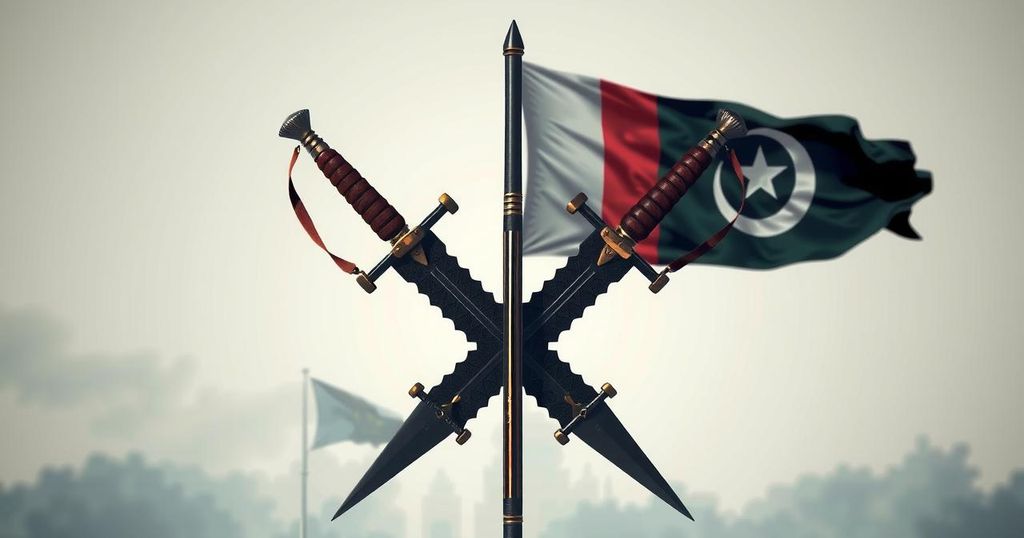Politics
ASIA, BANGLADESH, BANGLADESH ARMY, BANGLADESHI MILITARY, BEIJING, CHINA, COUNTER-TERRORISM, DEFENSE, DEFENSE COOPERATION, DHAKA, GREEN ENERGY, HAS, INDIA, MEXICO, MILITARY, NAVY, NEW DELHI, NORTH AMERICA, PAKISTAN, PLA, RAWALPINDI, SHAHID AMIR AFSAR, SHEIKH HASINA, SM KAMRUL HASAN, SYED AS
Omar El-Sharif
Bangladesh and Pakistan Strengthen Military Ties Amid Regional Concerns
Bangladesh and Pakistan are strengthening military ties, signaling a thaw in relations that has raised concerns in India. Recent high-level meetings and intelligence exchanges coincide with Bangladesh’s change in political leadership, with implications for regional security and India’s interests. China plays a crucial role in facilitating this cooperation, while increased ISI activities in Bangladesh prompt vigilance from India regarding potential threats.
The military relationship between Bangladesh and Pakistan is seeing significant strengthening, causing apprehensions in India. Recent months have witnessed a series of high-level defense meetings and intelligence exchanges between the two countries, which indicates an important shift in their traditionally strained relationship. This newfound collaboration aligns with Bangladesh’s current political transition and potential recalibration of foreign policy under its interim government.
In June, Admiral Mohammad Nazmul Hassan, Chief of Naval Staff of Bangladesh, engaged in discussions with Pakistan’s Army Chief, General Syed Asim Munir Ahmed Shah, in Rawalpindi. This meeting marked a second significant military interaction within the same month. A Bangladeshi delegation led by Lt. Gen. SM Kamrul Hasan had previously visited top military authorities in Pakistan, further solidifying their engagements.
Additionally, Bangladesh’s participation in a multinational naval exercise currently hosted by Pakistan signifies deepening military cooperation. Externally, China’s impact is notable, as a prominent delegation from the People’s Liberation Army (PLA) is involved in this exercise, confirming Beijing’s growing influence on regional military developments.
The military engagement extends beyond naval affairs, with preparations for the Pakistani military to commence training for Bangladeshi Army officials. High-ranking officers from Pakistan, including personnel from the Inter-Services Intelligence (ISI), have also visited Bangladesh, reflecting an emergent military alliance that contrasts starkly with the period during former Prime Minister Sheikh Hasina’s administration.
There are growing concerns regarding the increased presence of the ISI in Bangladesh, particularly as Major General Shahid Amir Afsar led a delegation to Dhaka—marking the first such visit in nearly two decades. This sequence of visits showcases an escalation in intelligence cooperation, following a Bangladeshi delegation’s earlier trip to Pakistan that was met with top-ranking military leaders.
These developments have raised alarms in New Delhi, prompting India’s Ministry of External Affairs to declare vigilant oversight over regional activities that impact its national security. The spokesperson emphasized a commitment to monitor all occurrences in the vicinity, indicating a proactive strategy to safeguard India’s interests.
India has historically been suspicious of ISI’s operations in Bangladesh, especially their past role in fomenting insurgencies within India’s northeastern regions. Under Sheikh Hasina’s governance, ISI’s influence was notably curtailed, but emerging ties between Dhaka and Islamabad suggest a revival that could threaten India’s stability.
China appears instrumental in reinforcing the ties between Bangladesh and Pakistan, with Bangladesh relying on China for approximately 72% of its military imports. As discussions of procuring 16 new warships by 2030 surface, Pakistan’s expertise in naval strategy and technology may prove beneficial to Bangladesh, highlighting the implications of enhanced Bangladesh-Pakistan relations on regional dynamics.
On the diplomatic front, relations are also warming, with increased engagement between leaders from both countries at international venues. Interim leader Muhammad Yunus recently met Prime Minister Shehbaz Sharif in important discussions, signaling a reconnection that reflects a shift from the previous administration’s policies.
In a tactical move, the interim government has begun easing trade restrictions with Pakistan, exploring reinstatement of direct maritime routes severed since 1971. This evolution of policy indicates a desire to diversify relations externally, counteracting years of India-centric alignment under Sheikh Hasina.
The implications of this Bangladesh-Pakistan cooperation are profound for India, especially concerning potential unrest in its northeastern territories. The resurgence of ISI’s activities could signal a return to destabilization strategies reminiscent of past decades, prompting India to bolster its border security measures to counteract any threats.
In response, India’s Border Security Force (BSF) is implementing advanced surveillance technologies along the Bangladesh border, particularly in the strategically vital Siliguri Corridor. The Indian defense sector is currently undertaking high-level inspections to evaluate risks posed by the burgeoning military collaboration between Bangladesh and Pakistan, marking a critical focus for national security.
The evolving military collaboration between Bangladesh and Pakistan raises significant concerns for India regarding national security and regional stability. With increased intelligence and military cooperation, compounded by China’s influence, the dynamics in South Asia are shifting, necessitating careful monitoring and proactive measures by India to mitigate potential threats. The reestablishment of ties between Dhaka and Islamabad signals a new era that could challenge established geopolitical alignments in the region.
Original Source: www.firstpost.com






Post Comment